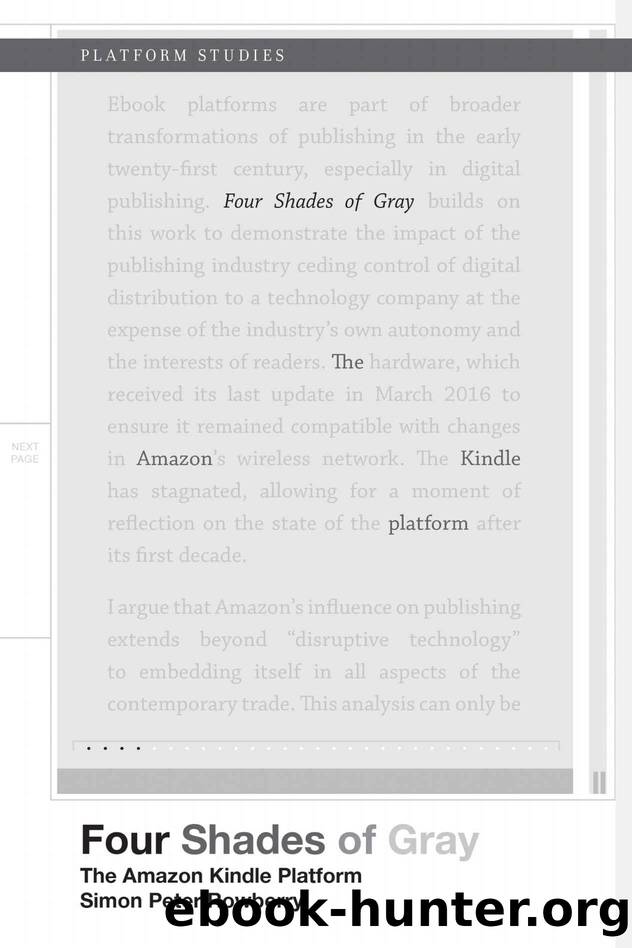Four Shades of Gray (Platform Studies) by Simon Peter Rowberry

Author:Simon Peter Rowberry [Rowberry, Simon Peter]
Language: eng
Format: azw3
ISBN: 9780262543507
Publisher: MIT Press
Published: 2022-04-05T00:00:00+00:00
7.1 An example of a popular highlight from Jane Austenâs Pride and Prejudice (2007). Screenshot from Kindle for PC 1.23.1.
Kindle Popular Highlights hints at the scale of Amazonâs data surveillance practices. Titles such as Victor Hugoâs Les Misérables and the English Standard Version Bible feature over a million highlights. The eight hundred ebooks discussed in this chapter have received a cumulative twenty-five million annotations. Many titles are not as popular as those discussed here, but overall, Amazon has a data set containing billions of shared highlights, with an even larger cache of saved âclippingsâ that users elected to keep private but store via Whispersync. The data asymmetry between Amazon and the public grew in mid-2014, when the list of most shared passages was removed from the Kindle Popular Highlights website.6 The list had been static since the last update in 2012, but it had become a âspineâ for navigating the website and discovering popular Kindle titles. Searching via the site or using exact ASINs allowed users to find individual product pages, but this required preexisting knowledge of the bookâs existence.
The closure of Kindle Popular Highlights in 2017 marked a turning point in Amazonâs public-facing services. While the company has blocked public access to the website, it continues to develop new methods for analyzing and using its large data sets to model consumption, including personalizing advertisements in print-on-demand books according to a userâs metadata profile to defray costs.7 Understanding what readers are interested in and how far through a book they will get, data only available through profiling digital consumption, creates more accurate profiles for personalization. Zuboff argues that the term âpersonalizationâ under surveillance capitalism is contradictory, as âit defiles, ignores, overrides, and displaces everything about you and me that is personal.â8 Since the data are aggregated, they do not reflect individual habits as much as a homogeneous âaudience.â Publishers have the same level of access as the general public due to Amazonâs self-interest in surveillance practices when completion rates and most highlighted passages might inform editorial and marketing developments. But what value do these data have? Can shared highlights provide insight into social reading?
Previous answers to these questions avoid the issues of scale and the limitations within the Popular Highlights data set with smaller case studies of shared annotation patterns in Sherlock Holmes, public domain works, or the most popular titles.9 These projects have largely ignored the integrity of the public data sources by focusing on manageable subsets to rein in the potential for chaos. The aggregated and individual highlights show Amazonâs mediation of shared reading and how this might influence usersâ understanding of a book, just as with an annotated copy of a library book. With access to the reading patterns of individuals and the aggregated list of ten popular highlights, we can see the influence of previous readersâ interests in shaping new interpretations. Kindle Popular Highlights and associated metrics offer a form of virality akin to retweeting, where resharing amplifies the visibility of a particular passageâs sentiment. The
Download
This site does not store any files on its server. We only index and link to content provided by other sites. Please contact the content providers to delete copyright contents if any and email us, we'll remove relevant links or contents immediately.
Asking the Right Questions: A Guide to Critical Thinking by M. Neil Browne & Stuart M. Keeley(5762)
Autoboyography by Christina Lauren(5228)
Eat That Frog! by Brian Tracy(4526)
Dialogue by Robert McKee(4389)
Sticky Fingers by Joe Hagan(4188)
Journeys Out of the Body by Robert Monroe(3619)
Annapurna by Maurice Herzog(3464)
Full Circle by Michael Palin(3443)
Schaum's Quick Guide to Writing Great Short Stories by Margaret Lucke(3376)
Elements of Style 2017 by Richard De A'Morelli(3343)
The Art of Dramatic Writing: Its Basis in the Creative Interpretation of Human Motives by Egri Lajos(3062)
Atlas Obscura by Joshua Foer(2955)
Why I Write by George Orwell(2945)
The Fight by Norman Mailer(2930)
The Diviners by Libba Bray(2927)
In Patagonia by Bruce Chatwin(2922)
The Mental Game of Writing: How to Overcome Obstacles, Stay Creative and Productive, and Free Your Mind for Success by James Scott Bell(2904)
Venice by Jan Morris(2568)
The Elements of Style by William Strunk and E. B. White(2470)
